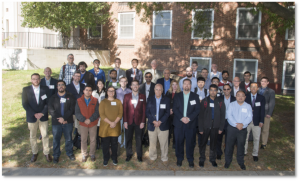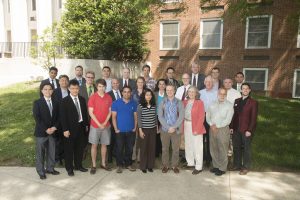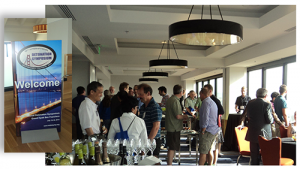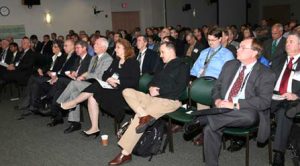The Center for Engineering Concepts Development holds periodic symposia in areas of current interest:
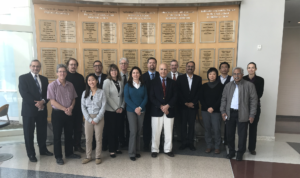
Participants in the Engineering for Social Change Symposium
Engineering for Social Change Symposium
We held a planning symposium in the area of Engineering for Social Change. A wide range of attendees from IIT Delhi (India), Toronto University (Canada), Khalifa University (UAE), Baylor University (Texas), University of San Diego (California), Department of Defense, the Waste Management company Covanta, College of Southern Maryland and the University of Maryland joined for a full day of discussions on this new and unique topic.
The objective of the symposium was to examine the viability of a regular conference on the subject of unintended consequences of engineering in the broader sense. The overwhelming thought that was gathered from the attendees is that a periodic symposium/meeting/think tank with a narrower focus but more unstructured format could possibly lead to a more useful output. The focus issues of this symposium included ethics and unintended consequences, the complexity of modern scientific and engineering solutions, the practice of social good and being socially inclusive when engineering products, the importance of metrics for impact, how technology has affected our learning, and the need for focus in such broad areas.
Data Driven Design Symposium
A symposium on Data Driven Design (D3) was spearheaded by Professor Peter Chung. This symposium focused on how industry and society can improve the design of complex engineered systems by learning from big data (whether generated by humans or machines). The event, attended by 53 participants, brought together researchers and technology leaders from a range of domains (from consumer products to military fleets) and stages in a system’s lifecycle (from concept creation through end-of-life/re-use). The symposium identified fundamental research challenges and opportunities in using data during design to improve performance and reduce cost.
The symposium achieved three specifically identified outcomes, the first being to outline state-of-the-art methods that collect and analyze product data — such as machine learning, artificial intelligence, crowd-sourcing, or online communities — and how they benefit or hinder different aspects of a design’s lifecycle — from conception to manufacturing to use or re-use. The second outcome was to forge new relationships and collaborations between researchers across academic, industrial, and national institutions that leverage our respective strengths to tackle mutual research problems, and the final outcome was to pose several open challenge problems to benchmark progress and catalyze future research.
Distinguished speakers included Richard Malak of the National Science Foundation, Prof. Harrison Kim of the University of Illinois at Urbana-Champaign, Prof. Mary Cummings of Duke University, Thomas Hedburg and Moneer Helu of the National Institute of Standards, Sudarsan Radchuri of the Department of Energy, Prof. Joshua Summers of Clemson University, Prof. Kemper Lewis of the University of Buffalo, and Prof. Levent Burak Kara of Carnegie Mellon University, Jun Li of the Naval Surface Warfare Center Carderock, Hyunmin Cheong of Autodesk Research and Prof. Monifa Vaughn-Cooke and Prof. Jeffrey Herrmann of the University of Maryland.
Computation Enabled Materials Discovery Symposium
Dr. Mark Fuge organized the Computation Enabled Materials Discovery Symposium as a forum to examine in a retrospective manner the challenges of developing and transitioning science and engineering software and codes (SESCs) from inception at mathematical levels, to deployment, to adoption. The focus of this one-day symposium was on topics related to mathematical and computational aspects of material science, and the event was attended by representatives from education, government and industry. The overall objectives were to identify common threads via shared experiences and success stories through a case-study approach and thereby offer new perspectives and insights about the genesis of contemporary scientific infrastructure. The longer term goals are to develop new educational and research programs in computational sciences, engineering, mathematics, and natural sciences that are more informed about expected challenges and more deliberate about contributing to new vibrant communities of computational scientific infrastructure creation.
Related Materials: Computation Enabled Materials Discovery Symposium report (21mb PDF)
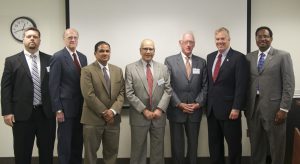
Autonomy Symposium: From left, Dylan Hazelwood, Jim Short, Chair Bala Balachandran, Davinder Anand, Millard Firebaugh, The Honorable John L.Bohanan, Jr., Dean Darryl Pines
Autonomy Symposium
We hosted a one day symposium on the topic of Autonomy. The Symposium was attended by representatives from industry, government laboratories, and faculty members from the Clark School of Engineering at the University of Maryland. Participants were welcomed by Prof. Davinder K. Anand, Director of CECD, and Prof. Bala Balachandran, Chair of the Mechanical Engineering Department. The Honorable John L.Bohanan, Jr., Democrat, District 29B, St. Mary’s County, made a special appearance at the symposium and addressed the participants, highlighting the role universities play in the skilled workforce development. Present at the symposium was also Prof. Darryll Pines, Dean of the Clark School of Engineering. The event created a continuing platform for discussion and establishing and strengthening working and ongoing relationships amongst a varied group of professionals.
The International Detonation Symposium (IDS)
Held every four years, the International Detonation Symposium was managed by the Center for Engineering Concepts Development in conjunction with the Naval Surface Warfare Center Indian Head EOD Tech Division in Indian Head, MD and United States Department of Defense and Department of Energy volunteers. The 15th and last symposium was held at the Grand Hyatt in San Francisco, CA, with 300+ attendees. The object of the symposia is to bring together scientists actively engaged in research on detonation and associated phenomena from all over the world. The papers presented were peer-reviewed (refereed), and published as proceedings.
National Capital Region Energetics Symposium (NCRES)
Held biennially, the objective of the National Capital Region Energetics Symposium is to provide researchers, developers, engineers, scientists, and program managers in Washington D.C, Maryland, and Virginia (government, academia, and industry) a forum for the exchange of information on current work related to the advancement of the technology and application of energetics and energetics systems.

